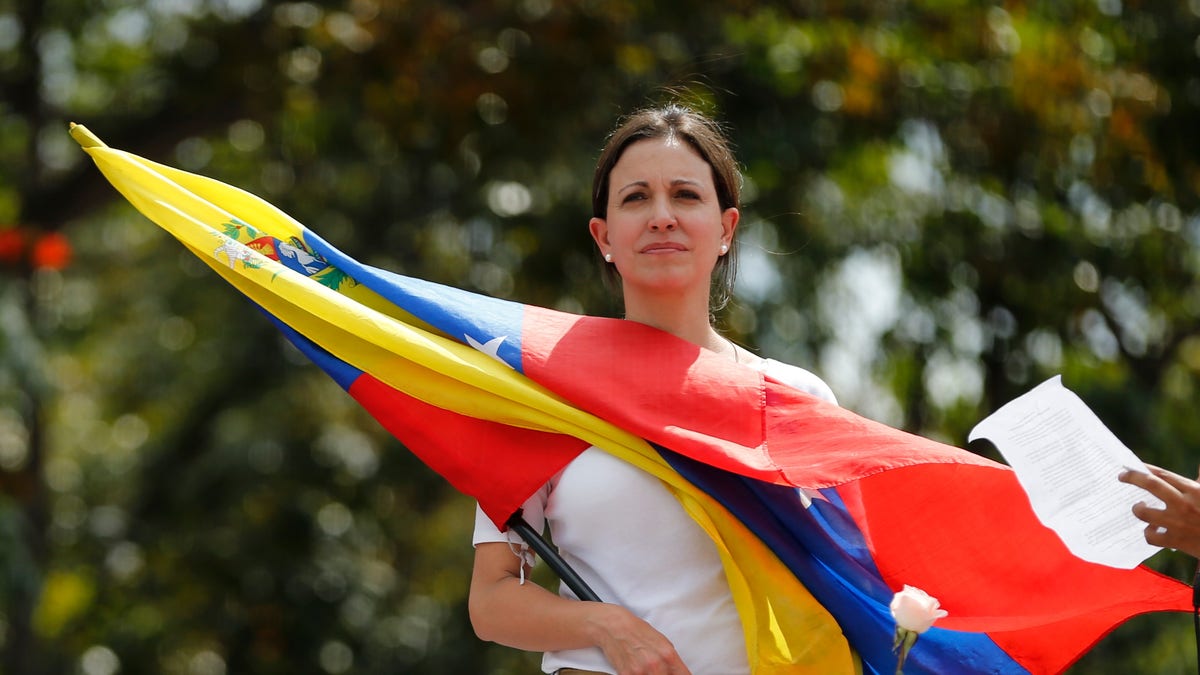
Leading opposition politician Maria Corina Machado during a rally in Caracas, Venezuela, Wednesday, March 26, 2014.
CARACAS, Venezuela (AP) – Venezuela's military, congress and Supreme Court are rallying behind President Nicolas Maduro and joining forces in an increasingly blunt response to the country's opposition as protests continue.
The Supreme Court on Tuesday sentenced the opposition mayor of a restive border city to a year in jail for failing to remove road barricades put up by anti-government activists. It sent another mayor to jail last week for the same reason.
Maduro has repeatedly accused the protesters of trying to stage a coup against his socialist government and drive him from power before his term ends in 2019. He also accuses the opposition of ignoring his mandate after pro-government candidates prevailed in mayoral elections in December.
On Tuesday, Maduro dramatized the allegation of anti-government plotting by announcing that three air force generals had been arrested for planning a coup, allegedly after meeting with members of the opposition. He later promised to seek the harshest penalty possible.
Diego Moya-Ocampos, a Latin American analyst at research firm IHS, said the arrests were likely intended as a message to the troops about the power the administration has over military tribunals.
"I think the sign he wants to send is, 'Be careful with the kind of dialogue you open, because you could risk losing your career,'" Moya-Ocampos said from London.
Details about the arrests remained scarce Wednesday, though Maduro singled out a prominent government critic who allegedly tried to meet the three: Rocio San Miguel, director of a group that monitors Venezuela's military.
San Miguel told The Associated Press she knew nothing about the allegations. She added that no coup against Maduro was remotely possible, given the president's dramatic expansion of the military's role running of the government.
Hours after Maduro spoke, the military issued an impassioned vow of loyalty to the president, insisting there were no cracks in its "monolithic" support and pledging to continue "protecting our people, guarding our homeland's sovereignty and supporting the constitutionally elected president and commander in chief."
Meanwhile, Congresswoman Maria Corina Machado, one of the most prominent opposition figures, returned to the country from Peru on Wednesday and led hundreds of protesters in a march through Caracas. The ruling party says it has stripped Machado of her seat and her immunity from prosecution after she denounced the government at a meeting of regional diplomats in Washington.
In February, as the protests started, the government accused hard-line opposition leader Leopoldo Lopez of inciting the violence, arrested him and gave him a hearing in a military jail, a step that Moya-Ocampos described as unprecedented in Venezuelan history.
Critics complained that Maduro's mentor, the late President Hugo Chavez, had imposed his will on the country's courts and legislature, and alarm about presidential interference has increased since Chavez's less-charismatic successor took office a year ago.
Leaders of the state run oil company have openly demanded support for Chavez, courts have repeatedly prosecuted prominent opposition leaders on corruption charges, prodding some into exile, and the biggest anti-government broadcasters have gradually been silenced or tamed.
The latest crackdown, however, seems to have come unusually quickly.
"With Maduro, the more he faces opposition, the farther away he moves from democracy," Moya-Ocampos said.
Follow us on twitter.com/foxnewslatino
Like us at facebook.com/foxnewslatino







































